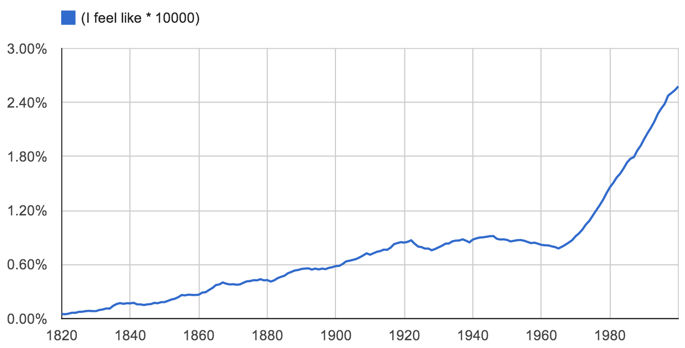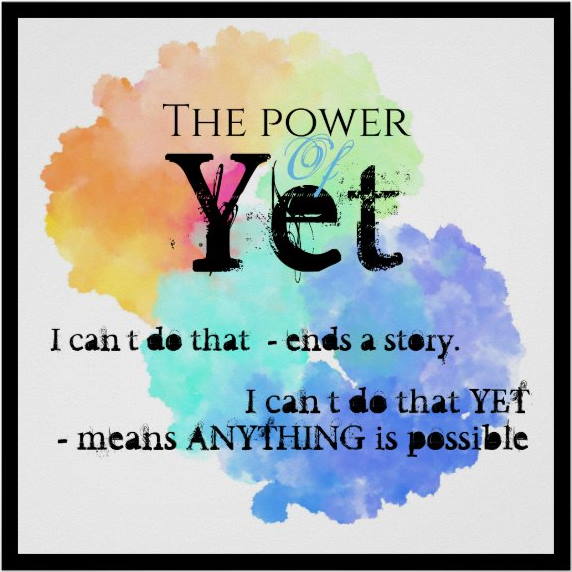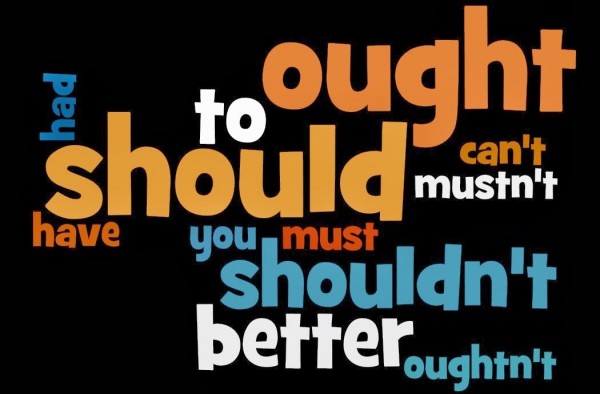There is an interesting trend that has been growing more and more common all around us: the phrase, “I feel like…” to describe any number of things. For instance, “I feel like a burger”, “I feel like things are going downhill”, “I feel like Jane doesn’t like me”, and “I feel like we should go with my plan for this project.” A quick scan of the internet will find a number of articles on this trend with some loose data showing it’s rise in the early years of the 2000’s among millennials, spreading to the Gen Xer’s, and now seemingly everywhere. 
Screen capture by author from Google Ngram Viewer
You might think this is a harmless trend, but from a psychological point of view, it actually has a huge impact. George Orwell stated it like this, “If thought corrupts language, language can also corrupt thought.” The very words we use can change how we think, feel, and act. That’s a lot of power and we need to use it wisely.
Let’s look at the phrases from above:
- “I feel like a burger.” Do you actually feel like a burger? How does a burger feel? Inanimate objects don’t have feelings.
- “I feel like things are going downhill.” You can’t feel a prediction about the future. You can think a prediction about the future based on observations or facts.
- “I feel like Jane doesn’t like me.” You can’t read Jane’s mind with your feelings, so there must be a reason why you think Jane doesn’t like you.
- “I feel like we should go with my plan for this project.” You actually think that thought but are stating it in a passive, non-assertive way which actually waters down your thoughts.
So why might people be using this turn of phrase these days? There are many possible reasons, two of them being:
- It sounds “softer”, more polite, and palatable to the listener. After all, we are Canadians and Maritimers at that, so being friendly and polite is kind of our thing. We also live in an age where we are more aware than ever of how our words may offend or harm others so we try to state things in a “softer” way, and as we all know, feelings are “soft”, right? (hear some sarcasm there because as a therapist I know feelings are never soft!)
- It shuts down debate and ends the conversation. We have been taught since we were young that our feelings are valid and we can’t argue with how someone feels, so when we state a thought as a feeling, no one can argue with us. The problem with that is it’s inaccurate and actually discourages communication and sharing of ideas which is exactly what we need to build relationships, communities, and society.
The next step is to then ask, “How do we start to address this and improve?”
Step 1: Listen and notice. Listen to those around you and to your own words. Can you hear yourself or others using this phrase? Listen for key words “like”, “that”, “as if”; “I feel like…”, “I feel that…”, “I feel as if…” These are all ways people will phrase thoughts as feelings and some of the red flags of language.
Step 2: Rephrase. When you hear yourself say, “I feel like you’re not listening to me,” try to rephrase it as a thought. “I think that you’re not listening to me,” allows me to state the reasons why I have this thought and can then promote a conversation that might actually lead to change and improvement instead of frustration. Interestingly, we are psychologically primed to hold onto our feelings because they are personal, so we aren’t open to hearing anything that doesn’t support them. But we are more open to changing our thoughts if there is evidence that supports this change. So not only does using accurate language promote communication, it also opens us up internally too.
Step 3: Be prepared for discomfort. When we have become so used to stating our thoughts as feelings, it feels almost dangerous to boldly put our thoughts out there is the world for all to hear! This can lead us to feel vulnerable (an actual emotion!), awkward, and uncomfortable. The good news is that this sensation will pass with exposure. The more you get used to stating your thoughts, the less of a discomfort it will be.
Step 4: Teach others. Once you start to get the hang of it, tell those around you what you are doing and how it is helping you. When those around us start actually communicating too, amazing things can happen!
Bonus Step: Label emotions. If you want to level up your communication game even more, try properly labelling your feelings. “I feel…” was originally meant to be a precursor to an emotion word and emotions are important data too. So be curious and try to figure out what you actually do feel. Here’s a useful tool to help you label your emotions: feeling wheel. Using an example phrase from above, “I feel like Jane doesn’t like me,” let’s put this into action. “I feel hurt because I think Jane doesn’t like me.” Emotions often lead us to take action, like in this case withdrawing from Jane or ignoring her to avoid feeling hurt. But what if Jane does like you and is just going through a rough time herself? You’ve just ended a relationship for no reason other than a temporary feeling you’re trying to avoid. By labelling your emotion you are now aware of the connection between your emotions, thoughts, and potential actions. That awareness allows you to then make choices about how to proceed. For instance, you can investigate your own thoughts. What facts make you think Jane doesn’t like you? Is the only fact your feelings of hurt? If so, that’s not a very strong argument. Has Jane been ignoring you? Cancelling plans? If so, could there be another reason why Jane is acting that way that isn’t because she doesn’t like you? Probably. So then you can approach Jane and actually ask her to get more information to decide if your thoughts are factual. This might sound like, “Jane, I’ve been feeling hurt recently because I think you are avoiding me and ignoring me. I wanted to talk to you about it as I don’t want this to become a bigger issue between us.” To which Jane might open up about her own struggles now that she knows you care enough about her to approach her with your feelings and thoughts, and she can acknowledge how her actions cause you to be hurt and she can take steps to improve on this. Now instead of losing the relationship, you’ve actually strengthened it. That’s the power of accurate language!
Take this week to work on noticing your “I feel like…” statements and following these steps to up your communication game!




